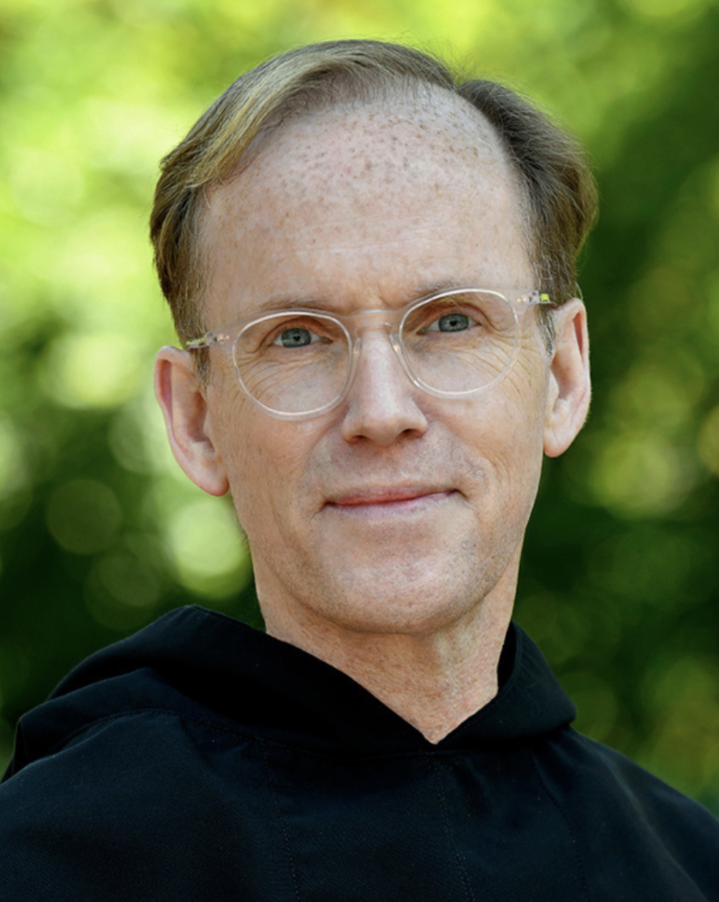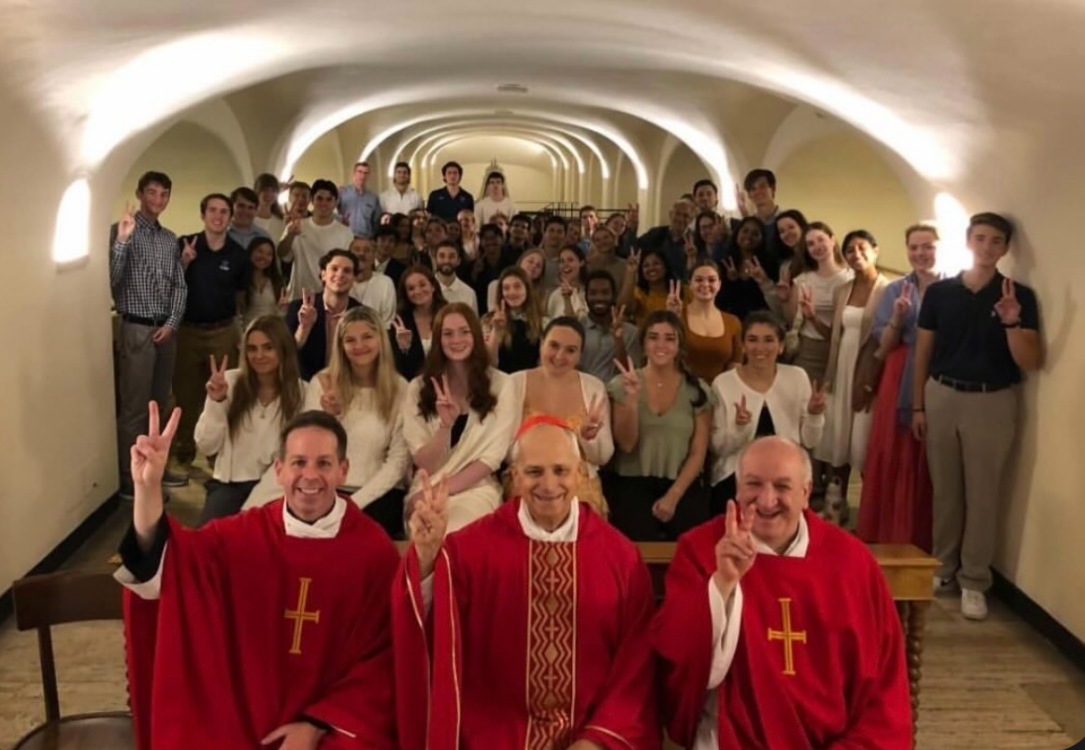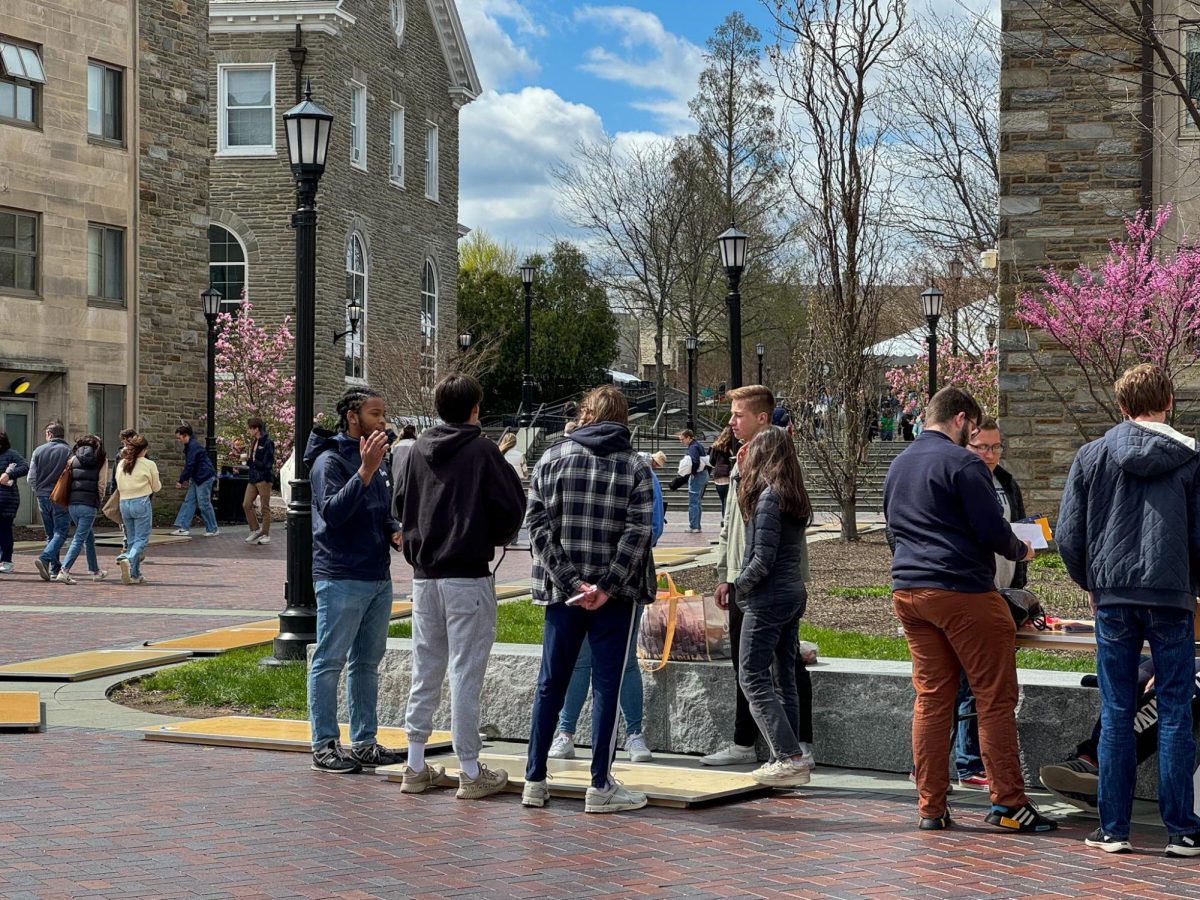This week, Villanova’s Political Science and Gender and Women’s Studies Departments hosted an academic panel on reproductive health in light of the November elections. What’s at Stake with Reproductive Health featured panelists Nancy Sharts-Hopko, Ann Juliano, Chelsea Gerrard, and Elizabeth-Jane McGuire. The panel was introduced by associate teaching professor, and OUS faculty advisor, Dr. Kelly-Anne Diamond, and moderated by senior students Alyssa Davis and Isabella Balian. The panelists introduced themselves. Then, the moderators began to ask individualized questions for the panelists based on their respective experience.
Sharts-Hopko was asked about reproductive healthcare from a medical standpoint and its role in her professional career. She commented on the limited accessibility of healthcare in America.
“We are the only developed country that does not ensure universal access to healthcare. These factors weigh into my experience on this topic,” Sharts-Hopko said.
She also pointed out that states with stricter abortion bans face disproportionately high rates of maternal mortality versus states without these bans. She pointed out the increase in infant mortality since the reversal of Roe v. Wade. She spoke on medical circumstances that may cause necessary abortions.
“Some of the kinds of life threatening things that may happen are sepsis and hemorrhage. Mothers may get blood clots to their lungs, brain or heart,” she said. “They may develop high blood pressures that lead to seizures, uteruses can rupture.”
She stated that these are all catastrophic events that require decision making.
“There’s no time to call the Attorney General or call the institutional lawyer,” Sharts-Hopko said. “There’s confusion in states based on what people are allowed to do. Physicians are threatened with loss of license or prison, which causes hesitation and causes OB-GYN doctors and students not to seekout education or practice in certain states where their medical judgment is being second guessed by the state legislature.”
Sharts-Hopko asked students and attendees to put themselves in the shoes of a woman losing her pregnancy.
“I want you to think about how it would feel to lose a pregnancy you really wanted to carry, only to be investigated for homicide, when it was not anything you did,” she said.
Juliano discussed the constitutional protections stated in a variety of cases related to reproductive health, like Griswold v. Connecticut, Roe v. Wade, and Planned Parenthood v. Casey. She also discussed the overturn of Roe v. Wade in Dobbs v. Jackson Women’s Health Organization.
In the Dobbs decision, the Supreme Court ruled that there is no stated right to abortion.
“One of the questions stated in this case is: Do we have rights that are not directly stated in the Constitution?” Juliano said. “If you read the Constitution, you are also not going to see the right to travel, or the right to vote. These are not listed in the constitution.”
This decision calls other cases into question, like the right to contraception and same sex marriage.
“Returning it to the states means there is no federal right to abortion,” she said. “Some people have the ability to travel to other states, and some do not.”
Juliano broke down any confusion or misunderstandings in these complicated cases and spoke on their importance to American women and America overall.
McGuire spoke on the panel to share her stance as a pro-life advocate and professor at Villanova for the Augustinian Cultural Seminar Program. She was asked about her stance on abortion as a Catholic woman and how she approaches conversations with people who hold a difference of opinion.
“A truly pro- life worldview encompasses care for the human person from conception until natural death, with an emphasis on the innocent and most vulnerable people in our society,” she said. “I am sure I differ on abortion policy, but I do share in common with panelists this idea that there needs to be policies that support women through their pregnancies, through birth and afterward. We need to take circumstances that make it hard for women to feel that they can have children and change those circumstances.”
She built on the biological evidence that supports her pro-life stance.
“A zygote is different from its mother. It has different DNA,” she said. “The unborn are worth our concern just as any person we can see. They deserve human rights. I don’t think you need to defend the pro-life decision on the basis of faith. It really isn’t because I am Catholic.”
She noted the importance of holding conversations with those who we disagree with, coming in with a sense of humility and curiosity.
“It’s really important to be able to put yourself in another person’s shoes and understand that one person’s circumstances can be radically different than our own,” she said.
She noted assumptions around the Catholic Church that all Catholics are pro-life, and notes that many Catholics want abortion reform.
Gerrard brought a unique position to the conversation. She shared her experience with infertility, PCOS and in vitro fertilization. She also noted her upbringing in Catholicism and states her familiarity with the Catholic Church’s teachings and perspectives.
“I am the person who couldn’t get pregnant,” she said. “I find myself in a reproductive endocrinologist’s office and I am diagnosed with PCOS. Reflecting back on what I had learned, I found that a lot of what was taught was very out of touch and a little bit inaccurate. There’s this idea that there are all these embryos being created. I had to fight for my embryos. For many people going through it, it’s a struggle to get healthy embryos.”
Gerrard brought students a raw, firsthand perspective on the misconceptions about reproductive health and how pregnancy and fertility are extremely nuanced.
Panelists were then asked about their concerns or comments on the future of reproductive health post-November elections.
“I am gravely concerned about the ability of the healthcare community to meet the needs of women who are pregnant and who have complications, and of teen mothers who may have been victims of statutory rape or physical rape,” Sharts-Hopko said.
McGuire spoke on abortion regulations.
“We need to be looking at this not as an issue for women, but as a culture,” she said. “As a religious person, I am concerned about restrictions on first amendment right, to be able to protest this. If abortion is to be legal, we need to have a lot more regulations. We need to have standards for facilities and for providers. There needs to be more mandated reporting. We need to have more conversations around the ethics around certain practices, so we don’t put things into law, whether that is pro-life or pro-choice, without having conversations about what this will look like for a doctor or for embryos that haven’t been implanted.”
Gerrard spoke on concern for access to infertility treatments and access to general reproductive healthcare.
“I am concerned about that being based on where you live,” Gerrard said. “It will impact you, it’s not about race, or political standpoint, it affects people everywhere.”
The event had a vast turnout with many Villanova students, staff and faculty attendees. Students were then given time to ask the panelists respective questions about their experience.
Senior attendee Laila Ghabrial spoke on her experience at the panel.
“The event was positive and educational,” she said. “I think overall this University needs to have more conversations around reproductive rights. It really struck me listening to the former nurse and the stories she has about how important reproductive freedoms really are. She really emphasized how many people can and are affected by anti- abortion laws and how this year women are on the ballot.”
The moderator of the panel, Alyssa Davis, echoed Ghabrial’s statement.
“One of the great things about this event was the panelists’ variety of backgrounds that added nuance to the discussion of reproductive health, which I think is often forgotten in politics,” she said. “We try to paint reproductive health as one thing or one story, but Ms. Gerard sharing her experience with infertility or Dr. Sharts-Hopko discussing cases she has seen in the medical field showed the realities individuals experience when accessing reproductive healthcare. With all that is at stake in this election, the panel helped me to further understand the gravity and implications of my vote.”
Ghabrial also spoke about the topics of religion during the panel.
“The diversity of thought is appreciated and I enjoy learning from all opinions, but at some points the discussion shifted more towards religious influences in abortion attitudes and less so of discussing what is really at stake in this election and what we are voting for,” she said.







